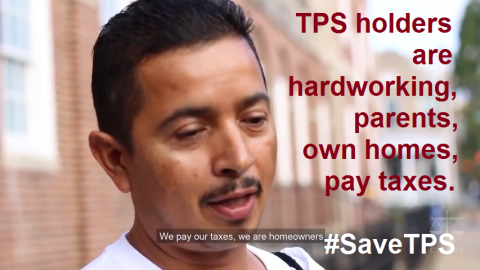
More than 300,000 people in the U.S. hold Temporary Protected Status, or TPS.
TPS allows them to live and work in the U.S. due to extraordinary circumstances in their countries of origin, such as war or natural disaster. TPS for different countries must be renewed on a rolling basis, or these individuals will lose legal status.
(For a list of the countries that hold TPS, the number of people affected, and the expiration date for each country, visit CLINIC's website).
Take action: Tell Congress to save TPS
On Monday, November 6, the Department of Homeland Security is expected to announce if the U.S. will renew TPS for 59,000 Hondurans and Nicaraguans.
If TPS is not renew, they will be given a date for when they are expected to leave the U.S. or be subject to deportation.
Listen to TPS holders explain why we should save TPS in this 2-minute video.
Please ask your Members of Congress to speak out in support of extending TPS and to support legislation that would ensure long-term stability for TPS recipients.
If TPS is revoked, many thousands will be forced to choose between living without documentation in the U.S. or returning to often unlivable conditions in their home countries, abandoning the lives they have built in our communities and neighborhoods.
A report from the Center for Migration Studies, an educational institute in New York that was founded by the Scalabrinian Missionaries, describes the TPS recipients from El Salvador, Honduras, and Haiti. The report includes ample evidence of hardworking people with strong family and other ties to the United States. High percentages have lived in the United States for 20 years or more, participate in the labor force at a much higher rate than the total U.S. population , speak English well, arrived as children, and have children who were born in the U.S. and thus are U.S. citizens.
The TPS recipients from El Salvador, Honduras, and Haiti make significant economic contributions by maintaining home mortgages, paying taxes, and working in industries crucial to the economy, such as construction, child care and health care. After many years of uncertainty, these vulnerable people should be afforded the right to stay where they are most safe, most able to maintain strong family ties, and where they are making the greatest contributions to society.
